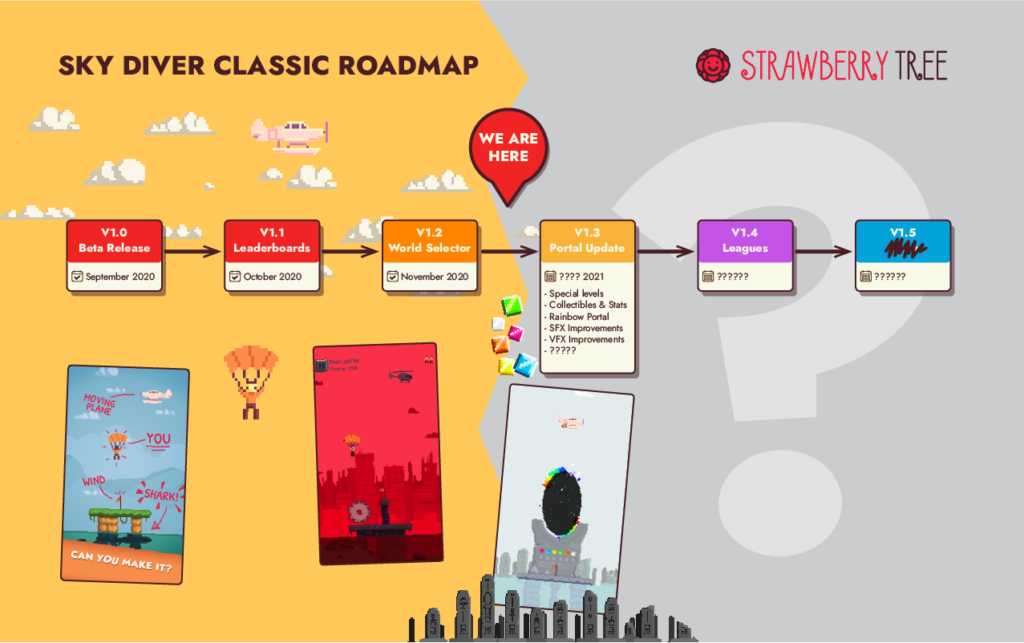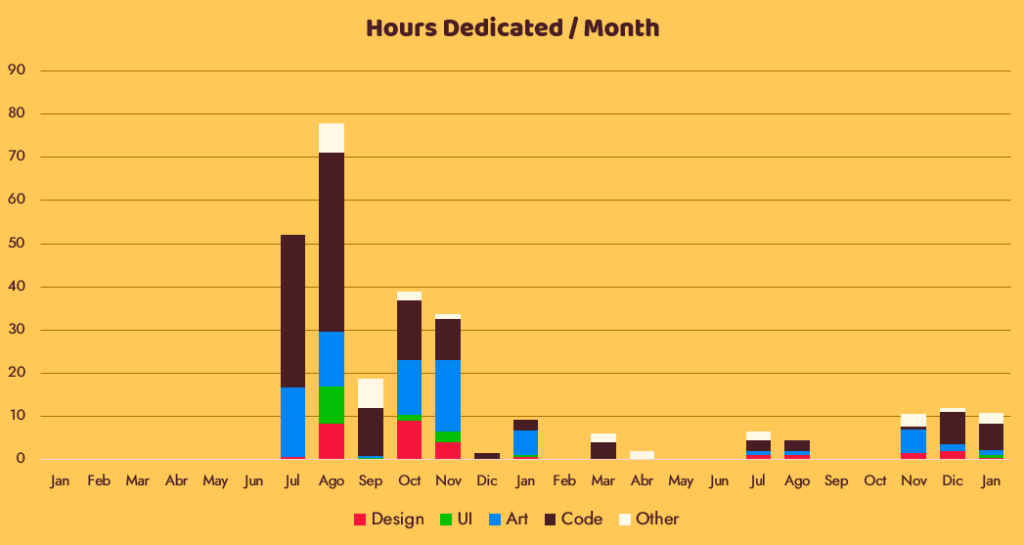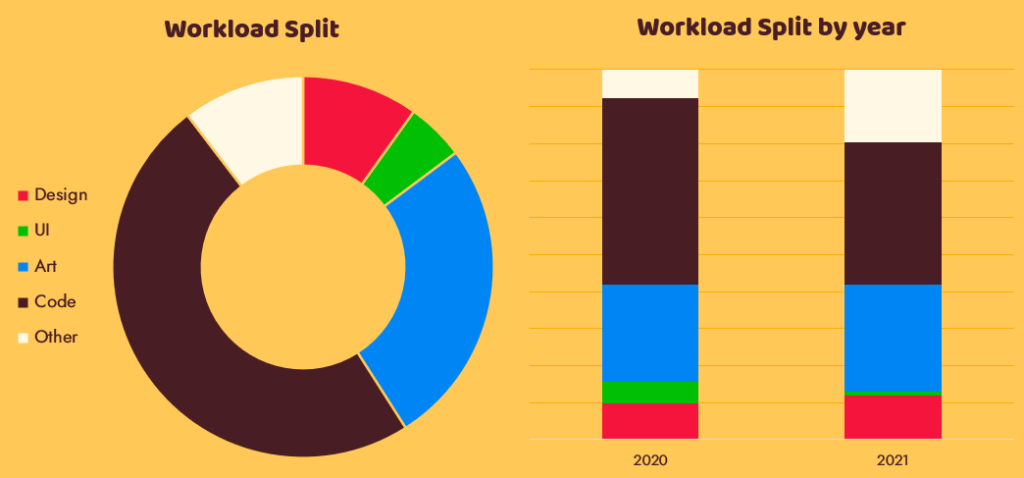How long does it take to make and publish an indie game? The 2020-2021 Sky Diver Classic Post-Mortem
If you are thinking on getting into game development or are just curious you probably have heard lots of cautionary tales. It’s not easy, even for a seasoned developer. Especially if you are doing it in your free time and must balance it with a full-time job like it’s my case.
It’s in these cases where experience is vital. Not because I’m faster at doing things, no. In this industry you are learning new things all the time, and experience helps avoiding some mistakes, but no one can be a master in everything, and if I wasn’t doing anything new, I wouldn’t be enjoying it! The reason why experience is crucially important is estimating the amount of work that something is going to take and knowing what to cut down and how to keep the game small enough so you can complete it. Most game development projects fail at this point leaving their developers burnt out and with a feeling of regret to ever trying to make that “simple” game. Because even if you are aware that it will take very long, maintaining the motivation and the will to put the work in can get absurdly hard as the time passes. So how long does it take to make and publish an indie game?
2022 is the 3rd year (yep. Third. Year) in the making of Sky Diver Classic. And it’s still far from finished! Last year in March I shared the following roadmap on my social media:

I was very careful of not including any very specific future dates, as I knew my time would be limited, though I did think that I’d manage to get V1.3 out before the end of the year. And, sadly, I’m pretty much still in the same place that I was. Now, this sounds a bit ridiculous considering the kind of game we are talking about, but bear in mind that I only work in Sky Diver Classic in my spare time, and that is quite scarce.
The “good” news is that in full-time circumstances it would have taken me just around 6 weeks to get it to this state. How do I know it? Because I keep track of every single hour I’ve been working in this project.
So let’s have a look at some data from the project:

Some numbers:
- It took me around 130 hours (16 full-time days) to develop and release the first Open Beta.
- It took me around 200 hours (25 full-time days) to release the version that is currently out in the store.
- In all of 2021 I’ve worked around 50 hours (not much more than a full-time week!), which is less than what I did in the first month of development.
- I’ve worked a total of 34 full-time days in the project.
Takeaways:
- Working too much will quickly lead to burnout – I started working around 4-6 hours in the weekends as well as 1-2 hours after work. It’s very hard to keep this up. I soon dropped the weekends and then I switched to start before work instead of after: I’d wake up a little earlier, work 1 or 2 hours in the game, and then switch to my actual paying job. This works well as I dedicate my best hours to my project instead of the worst ones. Also you can’t extend it, so you can’t overwork yourself too much. Obviously, this may not work for everyone, and not having a commute since I was working from home helped to not have to start stupidly early.
- Anything that requires time outside work is going to affect your performance – As you can’t stop your actual job, your passion project is the first thing to remove if you need more time. Health issues, house problems, weddings, holidays, you name it. You can’t dedicate time to the project if you must deal with something else outside working hours, accounting for this is vital. If any personal issue will make your project fail, that’s a problem, because they are going to happen. You can see how my performance in 2021 has been very poor, not even managing 10 hours most months (I won’t bore you with my life details, but this has been due to dealing with several personal complications like my wedding! :D), but that hasn’t stopped me.
- They say one of the negative effects of working during very short periods of time, is that finding out where you left last time and starting to work takes some time that you don’t need to do if you have a longer session without stopping. I think this effect is pretty much cancelled by the fact that I always work the best hours, so my concentration is always good. I spend more time starting and getting in the zone, but after that I’m faster and more focused.
- Wearing many hats helps with motivation, there is always something you can do to advance the project that you may feel like doing. You don’t want to code? Do some art!
- Keeping track of the time used in your project do helps a lot with having a better perspective and knowing when you are more productive and how much effort you are putting into the project.
With all this you can see how slow can be to do a passion project, and why, if you ever want to finish yours you need to make it as simple as you possibly can.
Many hats
When you are on your own, you must dedicate time to a lot of different disciplines. This chart by paradox interactive summarizes some of the roles that can be required in game development, but there are more! And you must do all of them yourself.
I have split my time in 5 groups:
- 48% Code – Anything that uses a programming language. Dealing with configurations and third-party libraries also count as code.
- 27% Art – Anything that has to do with graphics, sound and animation like pixel art, sprites, textures, screenshots, icons, music, etc.
- 10% Design – Tuning of values, level design, writing, design documentation (which a barely do as I’m only one).
- 5% UI – Setting up and laying out the interface of the game, popups, buttons, etc. Some would consider this part of art, and some would consider it code, but I think it deserves its own category.
- 10% Other – Anything that it’s not the aforementioned: Platform accounts management, analytics, social media, website management, writing this blog post, etc.

The takeaway here is that almost half of the time I’ve spent in this game has been programming, so if you are reading this trying to figure out how to make your own games, learning a bit of code can be a good starting point!
Also don’t forget there are a lot of other tasks that need to be done outside the development of the game, which in my case accounts for a 10% of the time, but bear in mind I haven’t started to market the game yet, which should take an increasingly big amount of time.
Next blog post I’ll try to analyze the game’s performance as it’s been so far. Spoiler alert: It’s not good.
Want to know more about any other game development topics or issues? Leave me a comment or contact me in social media and I’ll be happy to write about it!
Want to try Sky Diver Classic? Here is the link: https://play.google.com/store/apps/details?id=com.StrawberryTreeGames.SkyDiverClassic

